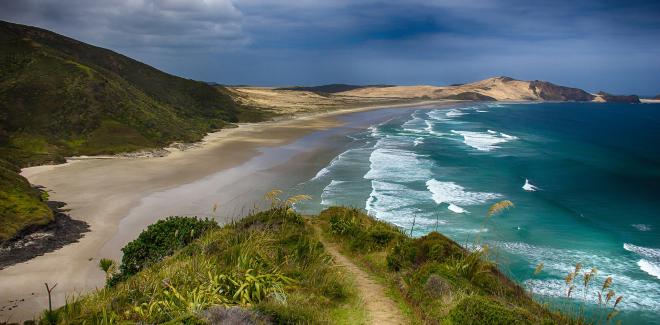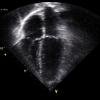How metadata is helping support New Zealand conservation and Indigenous data sovereignty priorities
Dr Libby Liggins is a Royal Society Te Apārangi Rutherford Discovery Fellow based at Massey University, and a Research Associate of the Auckland Museum Tāmaki Paenga Hira.
Libby’s research addresses fundamental questions in the ecology and evolution of marine systems, often using genomic information. She recently joined the Genomics Aotearoa Data Repository team to co-develop an infrastructure that supports the stewardship of genomic data so that it may be re-used for biodiversity research and to inform conservation.
Libby has been leading the MBIE Catalyst Seeding funded Ira Moana – Genes of the Sea – Project that is assembling a database of genetic and genomic data for Aotearoa New Zealand’s marine organisms.
“Aotearoa is a marine nation – we have one of the largest exclusive maritime economic zones in the world, sustaining our lucrative marine and tourism industries, and providing significant recreational and social benefits for New Zealanders," says Libby. "Nationally, and as a global citizen, we are under increasing pressure to make informed decisions regarding commercial and recreational activities, and how they can be balanced with the protection of our marine ecosystems. Such decisions need to be transparent and based on robust information, including knowledge about biodiversity that stretches from ecosystems to genes.”
Collaboration with Genomics Aotearoa now enables the Ira Moana Project’s metadatabase to link with genomic data that is held in Genomics Aotearoa's data repository. The data repository uniquely provides a restricted access alternative to the international open-access repositories for raw and processed genomic data (Hudson et al. 2020).
Libby and the Genomics Aotearoa data repository team will be working together with New Zealand eScience Infrastructure (NeSI) to ensure the data repository is compatible with international biodiversity, genomics, and Indigenous data sovereignty metadata standards, and is interoperable with the Ira Moana Project metadatabase in the Genomics Observatories MetaDatabase (GEOME).
In particular, the Genomics Aotearoa data repository will provide an appropriate secure repository for the storage of the Ira Moana Project’s curated genetic datasets – these include genotype files for natural and wild marine populations – ready for use and analysis toward meeting national biodiversity and conservation priorities, and international obligations in reporting, at the discretion of Māori partners.
For decades, New Zealand scientists have been generating genetic and genomic data for hundreds of our marine species. These data could now be re-used to inform intraspecific biodiversity assessments, monitoring, and management (Laikre et al. 2020, Hoban et al. 2020). However, such re-use requires information (metadata) regarding the spatial and temporal provenance of the genomic data (Pope et al. 2015, Toczydlowski in review*). The Ira Moana Project has been curating this metadata – providing the ‘where’, ‘when’, and ‘by whom’ – for genomic data so that it can be re-used to inform national biodiversity and conservation priorities.
The Ira Moana Project’s metadatabase adheres to the latest international standards for biodiversity and genomic data, set by Darwin Core and the Genomics Standards Consortium. The project capitalises on nine years of collaboration, knowledge, and tool generation by Libby and colleagues within the Diversity of the Indo-Pacific Network – assembling the largest marine population genetic database in the world. The project uses the infrastructure provided by GEOME – a web-based database purpose-built to capture the metadata associated with biological samples (Riginos et al. 2020).
Libby sits on GEOME’s Steering committee, and says that the Ira Moana Project is the first national-scale project to use the infrastructure.
“GEOME provides the Ira Moana Project with an international presence and helps to link genomic data already in open-access repositories with our national identity, communicating important contextual information about the genomic data that is not retained elsewhere,” she says.
Over the past three years, the Ira Moana Project has extended GEOME’s metadata capability to acknowledge and include national and Māori interests. Standard metadata fields are now available to communicate the identity/ies of mana whenua and the te reo Māori names of species and individual organisms so that this information is not erased or invisible to the international research community.
Furthermore, through collaboration with Local Contexts, ENRICH, and Te Mana Raraunga (the Māori Data Sovereignty Network), the Ira Moana Project and GEOME now allow researchers to add Notices and are beta-testing the application of Biocultural Labels as metadata for genomic data. The Notices signal that there are accompanying Indigenous rights that need further attention for any responsible and equitable future use of the data (Liggins et al. 2021). Biocultural Labels further describe the expectations for future use defined by the Indigenous community (Anderson and Hudson 2020), thereby enabling Indigenous stewardship and persistent recognition of Indigenous rights within an international framework.
For more information on the Genomics Aotearoa data repository, visit the Genomics Aotearoa website.
For more information on the Ira Moana Project, or to contribute to the dynamic data resource, you can see the Project website (https://sites.massey.ac.nz/iramoana/). For related research activities, see further links below.
Publication in review:
* Toczydlowski RH, Liggins L, Gaither MR, Anderson TJ, Barton RL, Berg JT, Beskid SG, Davis B, Delgado A, Farrell E, Ghoojaei M, Himmelsbach N, Holmes AE, Queeno SR, Trinh T, Weyand CA, Bradburd GS, Riginos C, Toonen RJ, Crandall ED. Lost in time and space: Poor data stewardship will hinder global genetic diversity surveillance. PNAS: in review
Links:
- Darwin Core
- Diversity of the Indo-Pacific Network
- ENRICH
- Genomics Observatories MetaDatabase
- Genomics Standards Consortium
- Group on Earth Biodiversity Observing Network (GEOBON) Genetic Composition Working Group
- Ira Moana – Genes of the Sea – Project
- Local Contexts
- Te Mana Raraunga







